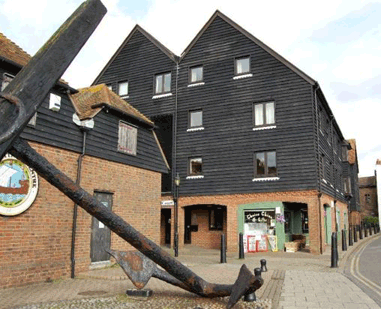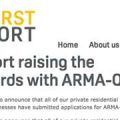

During the Second World War, when Eric Matthews, 94, was an RAF squadron leader, he was used to chalking up downed enemy aircraft. Now he is celebrating another victory over a lesser adversary: Peverel, which has had to pay back £11,475.34p.
The money is being re-paid after a series of inter-company deals by the property management company at Strand Court in Rye, East Sussex.
Peverel was criticised by the tribunal for treating the residents with “arrogance” and for “the intentional hiding of information to which residents would have been entitled” by doling out contracts to their own subsidiaries.
Excessive commission paid to Peverel’s insurance company Kingsborough accounts for £8,029.36p of the ruling, while a new emergency call and door system – fitted by Peverel’s sister company Cirrus, and of questionable value – involved a re-payment of £3,445.98p.
At one point, commissions charged by Kingsborough exceeded 33 per cent.

“This was an excellent win over a company who thought they were dealing with a group of elderly ladies who would not dare make a fuss,” says Matthews, who as a young air traffic controller watched Neville Chamberlain in 1938 land at Heston airport after meeting Hitler, wave a piece of paper and promise “peace in our time”.
He was assisted in the action by solicitor and former university lecturer Archie White, in his mid-eighties, who was the fellow applicant on the Leasehold Valuation Tribunal action. Another resident, Mary Smith, in her sixties and a local councillor, provided the back-up team.
The respondent in the case, as always, was the freeholder, Proxima GR Properties Ltd, part of the Tchenguiz Family Trust, but the issues concerned Peverel. It was given its marching orders from the site, which had exercised “right to manage”, in November 2011, and the bills were run up in 2005-2011.
A £9,143 quote from Cirrus – which the residents were not aware was a wholly owned subsidiary of Peverel – was provided to refurbish the door entry and Careline emergency call systems.
Matthews, who had in past won back £7,000 in redecorating costs, disputed whether the work was necessary and was described by the tribunal as “not without ability in this area”.
Indeed, the LVT declared, after visiting the site, that all that was required was a £200 mobile phone for the house manager.
“That the existing system was working was ignored and Peverel was intransigent. As to necessity, it could be said that the simple answer was that the system was working and there was no need to meddle.
“Peverel made great play of the duty to ensure the system was working properly … the regional manager said it could put people’s lives at risk.”
When Mr White queried the bill with Cirrus, he received a reply from a Peverel executive. In his view, the costs of the work should not have exceeded £5,700 and that the residents had been overcharged by £3,445.
The tribunal then considered the commissions charged by Kingsborough Insurance Services, “a sister company of Peverel and that was hidden from the residents”.
The tribunal said that Peverel could have employed a “legitimate broker in the City” who would have charged the “going rate for commission of 3 per cent to 4 per cent”.
“It would be manifestly straightforward for Peverel to instruct Oval (an insurance broker) directly but by also using Kingsborough additional money could be made from the residents …
“Also the residents were offered the services of Kingsborough to insure the residents’ contents, but they were not told that Kingsborough were part of Peverel.”

Kingsborough’s commission varied over the years, from 12.8 per cent to 33.05 per cent. Peverel accepted that the latter was too much and offered to reduce the sum to 14 per cent, but the residents refused.
Peverel even cited the case of Charter Quay, in Surrey – where insurance commissions were slashed from 23.5 per cent to 10 per cent at LVT – because the residents there were “professionals and quasi professionals and articulate”, therefore a smaller fee was reasonable. (Charter Quay is extensively reported on this site.)
Understandably, Mr White was not persuaded by this argument.
“Mr White submitted that in this case Kingsborough did nothing whatsoever of a useful nature to justify a charge of any amount and that in all the years quoted the commission should be disallowed.”
The tribunal referred to the the “total unwillingness” of Peverel to “tell residents what things really cost, what had been done and who did it, the residents would have, and did, believe that when told that work would be done by Cirrus it was because they were the best …
“The problem is that one can only conclude that to hide that information was part of an intentional hiding of information to which residents would have been entitled.
“So far as a relationship existed between Peverel and the companies concerned it was clear that nothing had been done at arms length”.
“… Peverel treated residents with some arrogance as was evidenced by Mr Richardson’s letter (a Peverel executive) when he admitted he simply signed off £9,000 without asking how the figure was made up. It was evident why he had not asked when aware they were sister companies.”
Citing “equitable principle”, the tribunal said these relationships should have been disclosed.
“There was certainly an overwhelming and binding obligation on managing agents who furtively and secretly employed a fellow company because, in the end, it rebounds against them.
“When it becomes public knowledge, as here , the fact that there had been a failure to disclose must affect adversely the rights of the agent.”
The full ruling can be read here:
http://www.residential-property.judiciary.gov.uk/Files/2012/May/CHI_21UG_LIS_2012_16_10_May_2012_15_38_50.htm
























